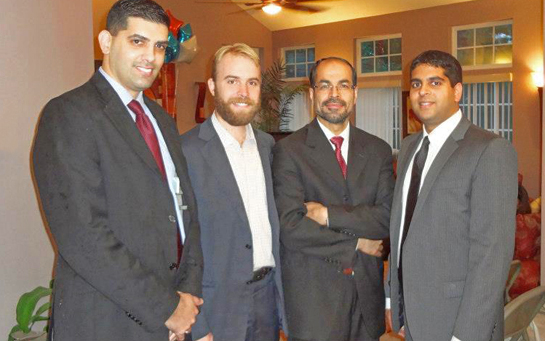 Among those attending the CAIR-Maryland iftar were from right board member Azim Chowdhury, CAIR Executive Director Nihad Awad, CAIR national chapter coordinator Todd Gallinger, and board member Saqib Ali. Photo courtesy of CAIR-Maryland.
Among those attending the CAIR-Maryland iftar were from right board member Azim Chowdhury, CAIR Executive Director Nihad Awad, CAIR national chapter coordinator Todd Gallinger, and board member Saqib Ali. Photo courtesy of CAIR-Maryland.
The Council on American Islamic Relations (CAIR) is one of the most widely respected and supported national organizations in the American Muslim community.
But here in the Washington DC metropolitan region where CAIR maintains its national office, the group is part of the local Islamic landscape. For a national office that seeks to focus on strategy, national issues and priorities, and developing platforms for American Muslims, dealing with individual issues of workplace discrimination – though important – can actually make CAIR's executive office less effective.
Enter CAIR-Maryland, a local CAIR chapter just a short drive away from the national office, but focused on local activism.
This past Ramadan, CAIR-Maryland held an inaugural fundraising iftar at the home of its new president, Maryland physician Mudusar Raza.
A former president of the Islamic Society of Frederick and Vice President of Maryland Muslim Council, Raza is no newcomer to activism or social work. The father of three served as a volunteer field doctor in Pakistan in the aftermath of floods which devastated that country in the summer of 2010, and he was awarded a Congressional Recognition for his work at Frederick Memorial Hospital in 2008.
The inauguration is actually a re-start for the Maryland chapter, which first launched in 2002 under the leadership of Seyed Rizwan Mowlana, then ceased operations for about one year, re-starting as CAIR Maryland-Virginia chapter in 2006. After taking some immigration rights cases, that chapter also suspended operations in 2008.
According to Raza, the rebirth of CAIR-Maryland was spearheaded by Zainab Chaudry, a doctor of pharmacy from Columbia, Maryland, in August of this year. Now serving as the Vice-President of CAIR-Maryland, Chaudry “was pretty much was the driving force in terms of the idea and [she was the one] who got everyone together [and] recruited people from the community. She worked diligently to comprise the people [on the board],” said Raza.
Raza described the mission of CAIR-Maryland as aiming to “improve the American Muslim experience by challenging Islamophobia and combating negative stereotypes about Islam and Muslims prevalent in television/media, pop culture, political discourse, and other public arenas, through education and empowerment, and to raise awareness and motivate local Muslims to become informed, productive, and civically engaged American citizens through conducting workshops, hosting seminars and events, and disseminating educational literature.”
“Key components to strengthening any democracy and enabling it to flourish and thrive include dispelling stereotypes, upholding justice, engaging in dialogue, promoting tolerance, and effecting positive change. The greatness of America lies in her diversity, and we are committed to keeping alive the legacy of tolerance, equality, and religious freedom gifted by the founding fathers of this nation,” Raza wrote to the Muslim Link in an email interview.
At the iftar fundraiser, CAIR Executive Director Nihad Awad stressed the need for local activism in Maryland, noting that Maryland and Virginia are the missing links in CAIR's nationwide chapters.
“Muslim have been succeeding in [Maryland], but we must succeed organizationally, it seems we've been succeeding accidentally,” said Awad, who before speaking was fielding calls from CNN and BBC regarding the shootings at the Sikh temple in Milwaukee which occurred earlier that same day.
Although organizers said the chapter needs $50,000 to start, the goal for the evening was kept at $20,000. Mudusar Raza made the first donation with a $5,000 pledge.
Zainab Chaudry said the funds will be used for “business operations, website development, printing, and event coordination.”
CAIR-Maryland's board is made up of American born, second generation Muslim immigrants, a reflection of that group's increasing involvement and leadership in the American Muslim community.
“The average age of this board is barely 30, [and its made up of] young professionals who want to make a difference,” said Raza.
Besides Raza and Chaudry, the board includes Government Relations Coordinator Saqib Ali, a former Maryland state delegate from Montgomery County; Civil Rights Coordinator Azim Chowdhury, an attorney and MBA who graduated from the University of Maryland School of Law and also from Montgomery County; Events Coordinator Noreen Zaman, a licensed Registered Nurse who lives in Annapolis; and Community Organizing & Outreach Coordinator Zeeshan Mustafa, an attorney also from Montgomery County.
Zainab Chaudry said CAIR-Maryland took its time to select an effective board.
“This was a long-winded process. Every effort was made to take into account the needs of the local communities when deciding on the board. Experience, educational background, potential contributions, extent of activism and community involvement - these were among numerous factors taken into consideration. CAIR is a not-for-profit, apolitical non-sectarian civil rights and advocacy organization. Every effort was made to be inclusive and ensure the executive committee appointed would reflect the organization's mission and values, while striving to represent the interests of Maryland's diverse Muslim population,” Chaudry told the Muslim Link.
Asked what their first priority is, Raza said “the task of organizing and getting the message to the community is key … we want to let people know of our existence and that we are here to help educate, empower and fight for our civil rights.”









Comments powered by CComment